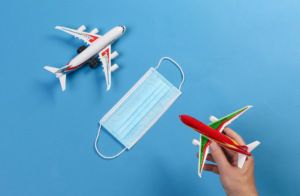News
New South African corona variant could be resistant to vaccines, warns KU expert
This article is more than 4 years old.
Britain and Israel have suspended all air travel to the region, with the EU expected to follow suit today

No more flights to southern Africa (photo: Marco Verch Professional Photographer/Flickr)
Both Britain and Israel have placed several southern African countries on their red lists in a bid to stop people bringing in a new variant of the coronavirus that the World Health Organization is likely to denote as one of ‘interest’ or ‘concern’ by tomorrow.
Unlike the Delta variant, which only has two mutations, ‘B. 1.1.529’ has ten. It is described as being highly contagious, and it will be of no surprise if it is soon ascribed the ‘Epsilon’ label.
Among the countries on the red lists are South Africa, believed to be the source of the new variant, and Lesotho, Botswana, Zimbabwe, Mozambique, Namibia and Swaziland.
All air travel between the countries and Israel and Britain has ceased, and it is believed the European Commission will do the same, as its president, Ursula von der Leyen, tweeted confirmation of the plans this morning.
Worrying number of mutations
Professor Allan Randrup Thomsen, a virology expert at the University of Copenhagen, is concerned by the high number of mutations.
“We are familiar with some of the mutations. They are usually associated with being highly contagious and having a possible resistance to the vaccines,” he said.
WHO met yesterday and is expected to hold another meeting later today.
Cases of ‘B. 1.1.529’ have so far been detected in South Africa, Botswana and Hong Kong.










































